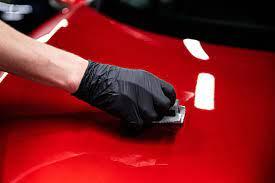Notifications

7 minutes, 29 seconds
-210 Views 0 Comments 0 Likes 0 Reviews

Applying a ceramic coating to your vehicle is a smart move—it offers outstanding protection, enhances shine, and simplifies maintenance. Make sure you have taken help from professionals who offer the best ceramic coating cars services. But to get the most out of your investment, what you do after the application is just as important as the coating itself.
Understanding the dos and don’ts after applying ceramic coating is key to preserving its performance and longevity. Here's a complete guide to help you take care of your newly coated vehicle the right way.
Curing time is critical. Once ceramic coating is applied, it needs time to bond with the paint and harden. Most coatings require a 24 to 48-hour initial cure period, and a full 7 to 14 days for total curing, depending on the brand and environment.
During this time:
Keep the vehicle parked in a clean, dry, covered area if possible.
Avoid exposing it to rain, bird droppings, tree sap, or sprinklers.
If it gets dirty or wet, gently blot with a microfiber towel—don’t wipe or scrub.
Even though your car might look showroom-ready, resist the urge to wash it too soon.
Avoid washing your vehicle for at least a week after the coating is applied to prevent interfering with the curing process. Soap, water pressure, and contact with wash mitts can weaken the bond or cause streaks and high spots to appear if the coating hasn’t fully cured.
Once the curing period is over and you’re ready to wash your car, be gentle. The coating is durable but not indestructible.
Choose a pH-neutral car shampoo specifically designed for ceramic-coated vehicles. These products clean effectively without stripping away the protective layer or causing damage.
Avoid:
Harsh detergents
Dish soap
Acid-based cleaners
These can degrade the coating prematurely and reduce its hydrophobic properties.
Automated brushes and spinning cloths in drive-thru car washes can scratch the ceramic coating, create swirl marks, or even wear down the surface.
Hand washing is always the safest choice for a coated car. If you must use a car wash, opt for a touchless system that uses only water and soap without physical contact. You can choose to take help from professionals who offer car detailing services. For instance, Belly is known to offer the best car detailing Alpharetta services.
After washing, dry your vehicle thoroughly to prevent water spots. Ceramic coatings are hydrophobic, so water will bead and sheet off easily—but droplets can still leave minerals behind if they dry on their own.
Use:
A clean, plush microfiber towel
A car dryer or air blower for a no-contact option
Tip: Work in the shade and avoid letting water sit for too long.
Unlike traditional waxed surfaces, ceramic coatings don’t require extra layers of protection.
In fact, applying carnauba wax or synthetic sealants over a ceramic coating can:
Mask the coating’s hydrophobic effect
Interfere with its self-cleaning properties
Diminish its signature gloss
If you want to boost shine or slickness, use ceramic-friendly maintenance sprays or topper products made to complement coatings.
To refresh the coating and enhance its gloss and water-beading behavior, consider using a ceramic detailer spray or SiO2 booster every few washes.
These products are designed to work in harmony with your coating and help prolong its performance. They're easy to apply—just spray and wipe with a microfiber towel after washing.
Even though ceramic coatings make your car easier to clean and more resistant to environmental contaminants, they’re not maintenance-free.
You still need to:
Wash your car regularly (ideally every 1–2 weeks)
Remove bird droppings, bug splatter, or tree sap as soon as possible
Store the car under a cover or in a garage when not in use
Neglect can still cause etching, staining, or water spots that may require polishing or even reapplication.
Depending on the brand and type of ceramic coating, a yearly inspection or decontamination wash is a good idea.
You may also need to:
Remove bonded contaminants using iron removers or clay bars (with caution)
Apply a ceramic topper to revive the coating’s characteristics
Some professional coatings come with warranty requirements that include annual inspections—check with your installer or manufacturer.
Ceramic coatings are excellent at resisting light scratches, UV rays, and chemical contaminants—but they aren’t a suit of armor.
They won’t stop:
Rock chips from highway driving
Deep scratches from poor wash techniques
Harsh chemical burns or long-term neglect
Understand its limits and treat it as enhanced protection—not total invincibility.
Ceramic coatings are a game-changer when it comes to long-lasting shine and protection—but only when cared for correctly. By following these dos and don’ts, you’ll preserve that glossy finish, keep the hydrophobic magic alive, and enjoy the full value of your investment.
Car Ceramic Coating Ceramic Coating car detailing Alpharetta

